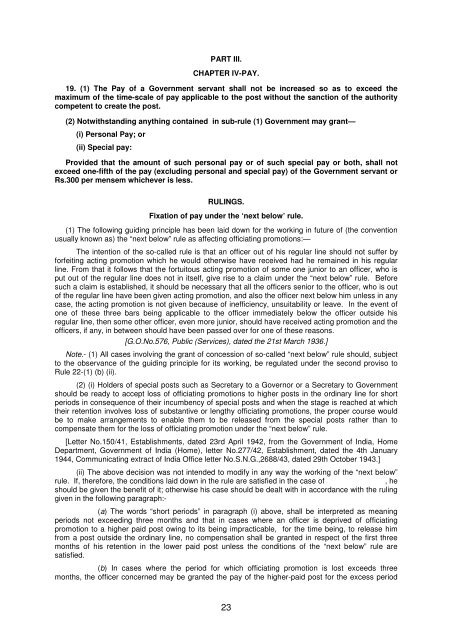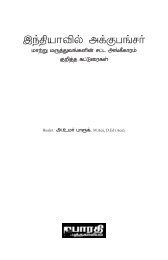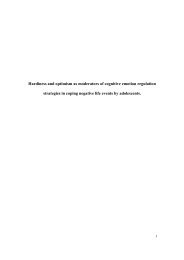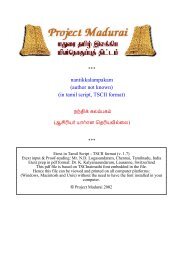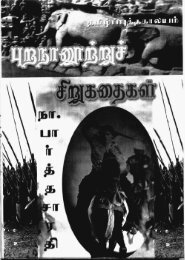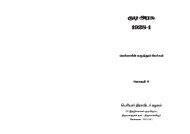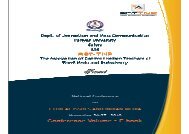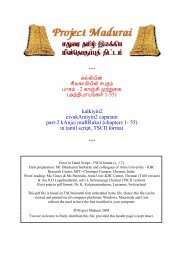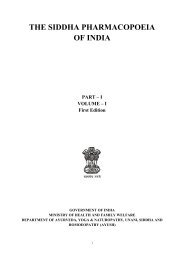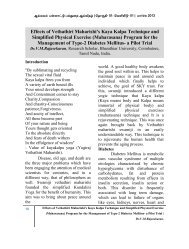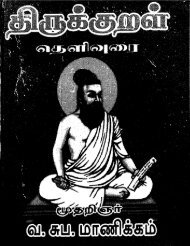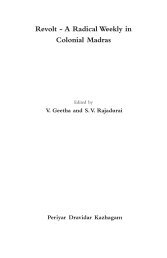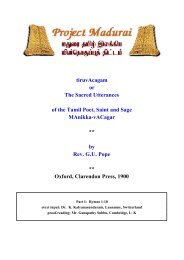THE FUNDAMENTAL RULES OF THE TAMIL NADU GOVERNMENT
THE FUNDAMENTAL RULES OF THE TAMIL NADU GOVERNMENT
THE FUNDAMENTAL RULES OF THE TAMIL NADU GOVERNMENT
- No tags were found...
You also want an ePaper? Increase the reach of your titles
YUMPU automatically turns print PDFs into web optimized ePapers that Google loves.
PART III.CHAPTER IV-PAY.19. (1) The Pay of a Government servant shall not be increased so as to exceed themaximum of the time-scale of pay applicable to the post without the sanction of the authoritycompetent to create the post.(2) Notwithstanding anything contained in sub-rule (1) Government may grant—(i) Personal Pay; or(ii) Special pay:Provided that the amount of such personal pay or of such special pay or both, shall notexceed one-fifth of the pay (excluding personal and special pay) of the Government servant orRs.300 per mensem whichever is less.RULINGS.Fixation of pay under the ‘next below’ rule.(1) The following guiding principle has been laid down for the working in future of (the conventionusually known as) the “next below” rule as affecting officiating promotions:—The intention of the so-called rule is that an officer out of his regular line should not suffer byforfeiting acting promotion which he would otherwise have received had he remained in his regularline. From that it follows that the fortuitous acting promotion of some one junior to an officer, who isput out of the regular line does not in itself, give rise to a claim under the “next below” rule. Beforesuch a claim is established, it should be necessary that all the officers senior to the officer, who is outof the regular line have been given acting promotion, and also the officer next below him unless in anycase, the acting promotion is not given because of inefficiency, unsuitability or leave. In the event ofone of these three bars being applicable to the officer immediately below the officer outside hisregular line, then some other officer, even more junior, should have received acting promotion and theofficers, if any, in between should have been passed over for one of these reasons.[G.O.No.576, Public (Services), dated the 21st March 1936.]Note.- (1) All cases involving the grant of concession of so-called “next below” rule should, subjectto the observance of the guiding principle for its working, be regulated under the second proviso toRule 22-(1) (b) (ii).(2) (i) Holders of special posts such as Secretary to a Governor or a Secretary to Governmentshould be ready to accept loss of officiating promotions to higher posts in the ordinary line for shortperiods in consequence of their incumbency of special posts and when the stage is reached at whichtheir retention involves loss of substantive or lengthy officiating promotions, the proper course wouldbe to make arrangements to enable them to be released from the special posts rather than tocompensate them for the loss of officiating promotion under the “next below” rule.[Letter No.150/41, Establishments, dated 23rd April 1942, from the Government of India, HomeDepartment, Government of India (Home), letter No.277/42, Establishment, dated the 4th January1944, Communicating extract of India Office letter No.S.N.G.,2688/43, dated 29th October 1943.](ii) The above decision was not intended to modify in any way the working of the “next below”rule. If, therefore, the conditions laid down in the rule are satisfied in the case of, heshould be given the benefit of it; otherwise his case should be dealt with in accordance with the rulinggiven in the following paragraph:-(a) The words “short periods” in paragraph (i) above, shall be interpreted as meaningperiods not exceeding three months and that in cases where an officer is deprived of officiatingpromotion to a higher paid post owing to its being impracticable, for the time being, to release himfrom a post outside the ordinary line, no compensation shall be granted in respect of the first threemonths of his retention in the lower paid post unless the conditions of the “next below” rule aresatisfied.(b) In cases where the period for which officiating promotion is lost exceeds threemonths, the officer concerned may be granted the pay of the higher-paid post for the excess period23


